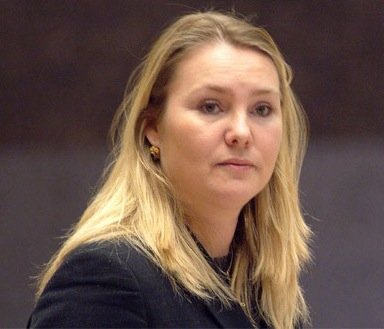The Daily Herald writes that Dutch Minister of Infrastructure and Environment Melanie Schultz van Haegen doesn’t have a structural, long-term solution for the occasional shortage of potable water in Saba, but she is working on it, she told the Second Chamber of the Dutch Parliament on Monday. The Minister said during the meeting of Parliament’s Permanent Committee for Infrastructure that she was consulting with Saba’s Government to take measures to prevent the situation that arose in February, March this year when the island suffered a severe water shortage. The situation was of such urgent nature that the Royal Dutch Navy had to bring water to Saba.
Member of the Second Chamber Wassila Hachchi of the Democratic Party D66 brought up what is generally termed as Saba’s most urgent problem during the debate. Hachchi reminded the Minister of the importance of guaranteeing sufficient potable water in Saba. Monday’s debate focused on water and related infrastructure in the Netherlands, but one of the agenda points was the result of this year’s potable water study on Saba by Vitens Evides International and the letter of November 4, 2013, that the Minister sent to Parliament on this issue. Hachchi pointed out that water was not only important in the Netherlands but also “of great importance” on the Caribbean Netherlands islands Bonaire, St. Eustatius and Saba. She mentioned the occasional shortage of potable water in Saba. The Member of Parliament (MP) called it “absurd” that the Dutch Navy has to be chartered in urgent situations to bring water to the island as was the case early March 2013. “It is clear that Saba needs a long-term solution,” said Hachchi, who regularly has brought up this issue, also by posing written questions to Schultz van Haegen.
Hachchi said she was glad to hear from the Minister that a solution was being worked on in the form of additional storage capacity. The Minister promised on Monday that she would inform the Second Chamber as soon as a solution had been reached with Saba. In her letter dated November 4, Schultz van Haegen explained that a short term measure would be to introduce five-gallon water dispensers which would be filled with water that has been desalinated at the local water plant. Financing has been reserved to execute the necessary measures, assured the Minister. Saba had asked The Hague to assist with the construction of additional water storage capacity. Schultz van Haegen said her Ministry of I&M acknowledged the concerns of Saba’s Government where it comes to quantity of potable water. She said that a “realistic and affordable” solution for the water quantity would be to construct additional storage capacity. According to the study by Vitens Evides International, a cooperation between two drinking water companies, a potable water network on Saba is not feasible because it would be too expensive due to the high construction and operational costs. Saba’s Government isn’t in favour of such a network either, also because people would be paying a high monthly price for something that they would need no more than a few months per year.
MP Hachchi further urged the Minister to work on another water related issue, namely the treatment of sewage water of Saba’s households. She asked the Minister to work on a long-term solution even though it proved difficult to set up a waste water treatment system.

 Archive of posts from Saba-News.com Archive Saba News
Archive of posts from Saba-News.com Archive Saba News